
I just discovered a nice video which explains the Zipf’s law .
I’m wondering if I can index the french lexique from Université de Savoie and find some funny things based on that…
Download french words
wget http://www.lexique.org/listes/liste_mots.txt
head -20 liste_mots.txt
What do we have?
It’s a CSV file (tabulation as separator):
1_graph 8_frantfreqparm
0 279.84
1 612.10
2 1043.90
3 839.32
4 832.23
5 913.87
6 603.42
7 600.61
8 908.03
9 1427.45
a 4294.90
aa 0.55
aaah 0.29
abaissa 1.45
abaissai 0.06
abaissaient 0.26
abaissait 1.29
abaissant 2.39
abaisse 5.39
The first line is the title. Other lines are really easy to understand:
- term
- frequency
Convert to JSON
I’ll use logstash 2.1.1 for this.
wget https://download.elastic.co/logstash/logstash/logstash-2.1.1.tar.gz
tar xzf logstash-2.1.1.tar.gz
As usual, I’m starting from a blank logstash configuration file, zipf.conf:
input { stdin {} }
filter {}
output { stdout { codec => rubydebug } }
I check that everything runs fine:
head -20 liste_mots.txt | logstash-2.1.1/bin/logstash -f zipf.conf
It gives:
Settings: Default filter workers: 2
Logstash startup completed
{
"message" => "1_graph\t8_frantfreqparm",
"@version" => "1",
"@timestamp" => "2016-01-05T11:33:16.269Z",
"host" => "MacBook-Pro.local"
}
...
{
"message" => "abaisse\t5.39",
"@version" => "1",
"@timestamp" => "2016-01-05T11:33:16.275Z",
"host" => "MacBook-Pro.local"
}
Logstash shutdown completed
Parse CSV lines
We have a CSV file so we should use here the CSV filter plugin :
csv {
separator => "\t"
columns => [ "term", "frequency" ]
}
Note You have to use the actual tab (ASCII character code 9) and not
\t!
It now gives:
{
"message" => "abaisse\t5.39",
"@version" => "1",
"@timestamp" => "2016-01-05T13:47:52.374Z",
"host" => "MacBook-Pro.local",
"term" => "abaisse",
"frequency" => "5.39"
}
Cleanup
We need to ignore the first line as it contains column names:
if [term] == "1_graph" {
drop {}
}
And we can also mutate the frequency field to become actually a number and remove non needed fields:
mutate {
convert => { "frequency" => "float" }
remove_field => [ "message", "@version", "@timestamp", "host" ]
}
We have now:
{
"term" => "abaisse",
"frequency" => 5.39
}
We still have a format issue as the original file is not encoded with UTF-8.
For example accompagné gives:
{
"term" => "accompagn\\xE9\\t15.65"
}
With some logstash warnings:
Received an event that has a different character encoding than you configured. {:text=>"ab\\xEEm\\xE9es\\t0.42", :expected_charset=>"UTF-8", :level=>:warn}
Looking at what the browser detected it looks like we have “Windows-1252” encoding here:
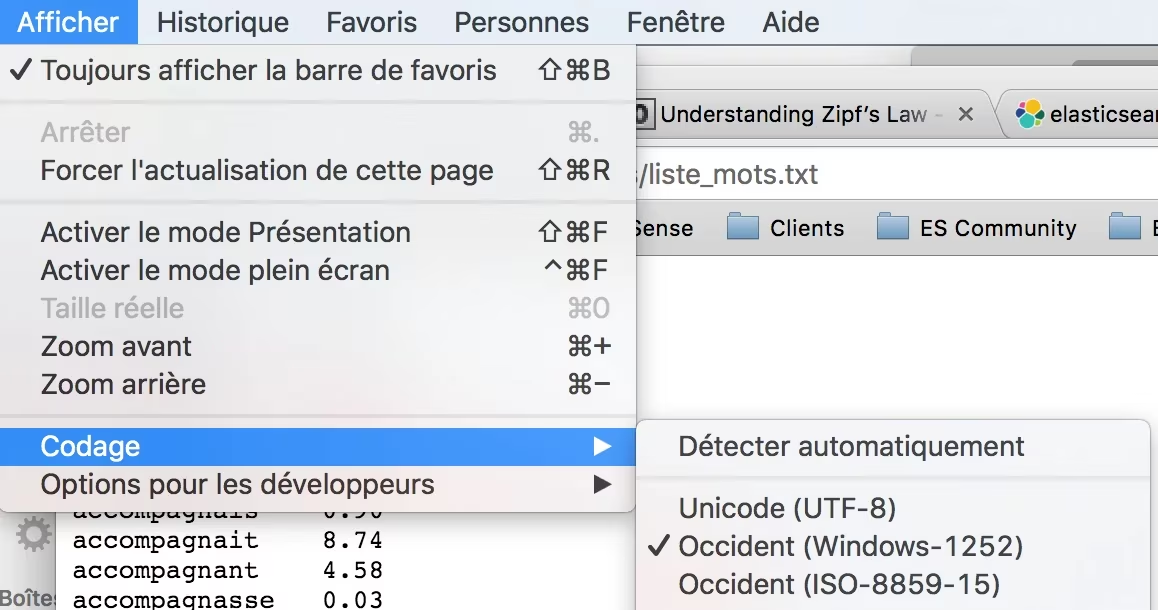
Encoding
So we need to tell logstash how to parse stdin:
input {
stdin {
codec => line {
"charset" => "Windows-1252"
}
}
}
Index and analyze
I’m going to use my found instance here. In seconds, I have up and running my elasticsearch cluster with kibana, all with the latest versions.
I just have to define my security settings, and configure logstash again.
output {
stdout { codec => dots }
elasticsearch {
ssl => true
hosts => [ "MYCLUSTERONFOUND.found.io:9243" ]
index => "zipf"
document_type => "french"
template => "zipf_template.json"
template_name => "zipf"
user => "admin"
password => "mygeneratedpassword"
}
}
We need a template here as we don’t want to analyze our term field. Let’s define zipf_template.json:
{
"order" : 0,
"template" : "zipf",
"settings" : {
"index" : {
"refresh_interval" : "5s",
"number_of_shards" : 1,
"number_of_replicas" : 0
}
},
"mappings" : {
"french" : {
"properties" : {
"term" : {
"type" : "string",
"index": "not_analyzed"
}
}
}
}
}
And now, run it on all the dataset and wait for its completion:
cat liste_mots.txt | logstash-2.1.1/bin/logstash -f zipf.conf
Most and less frequent french terms
According to this dataset, we can extract some information with Kibana:
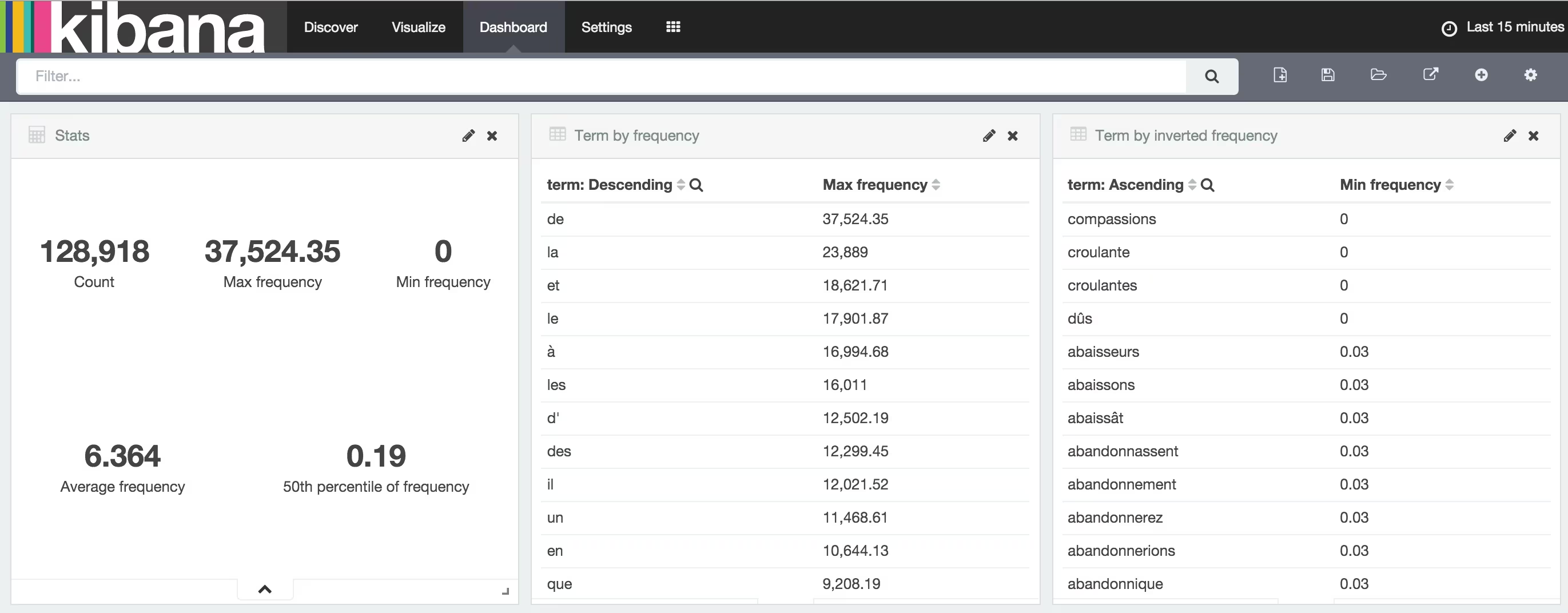
All french terms
We can see that obviously terms like de, la and et are very frequent but we use rarely the terms compassions, croulante and croulantes.
What? We have almost no “compassion” in France? Actually we do, but we use really often the singular form not the plural! Searching for compassion* in Kibana shows it:

compassion* terms
I also looked at terms starting with ch. It gives:
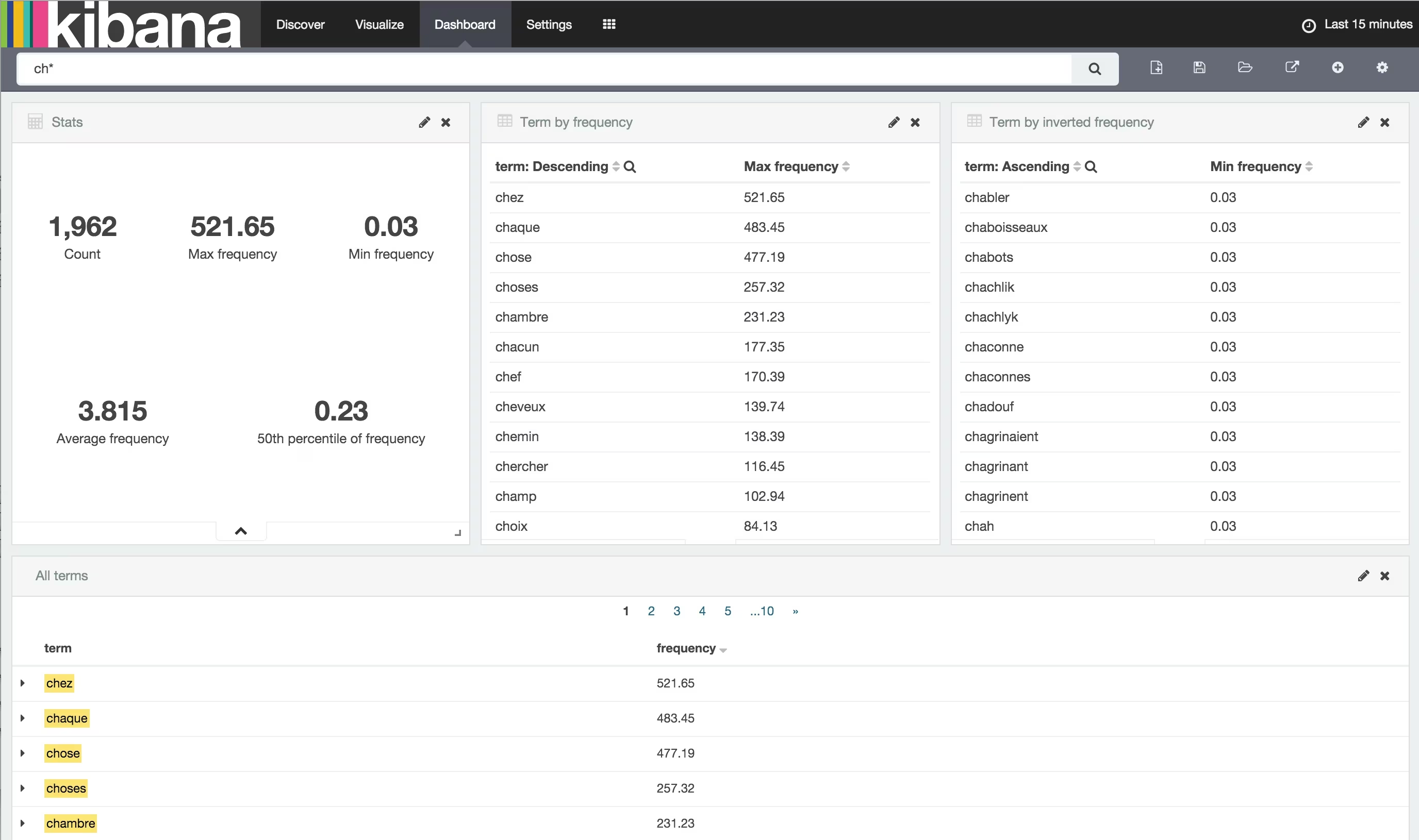
ch* terms
chez, chaque and chose are really common terms. I don’t know what chabler, chaboisseaux and chabots actually mean! :D
Zipf Law
Let’s build a final visualization and see if we can have a curve like the one exposed in the video.
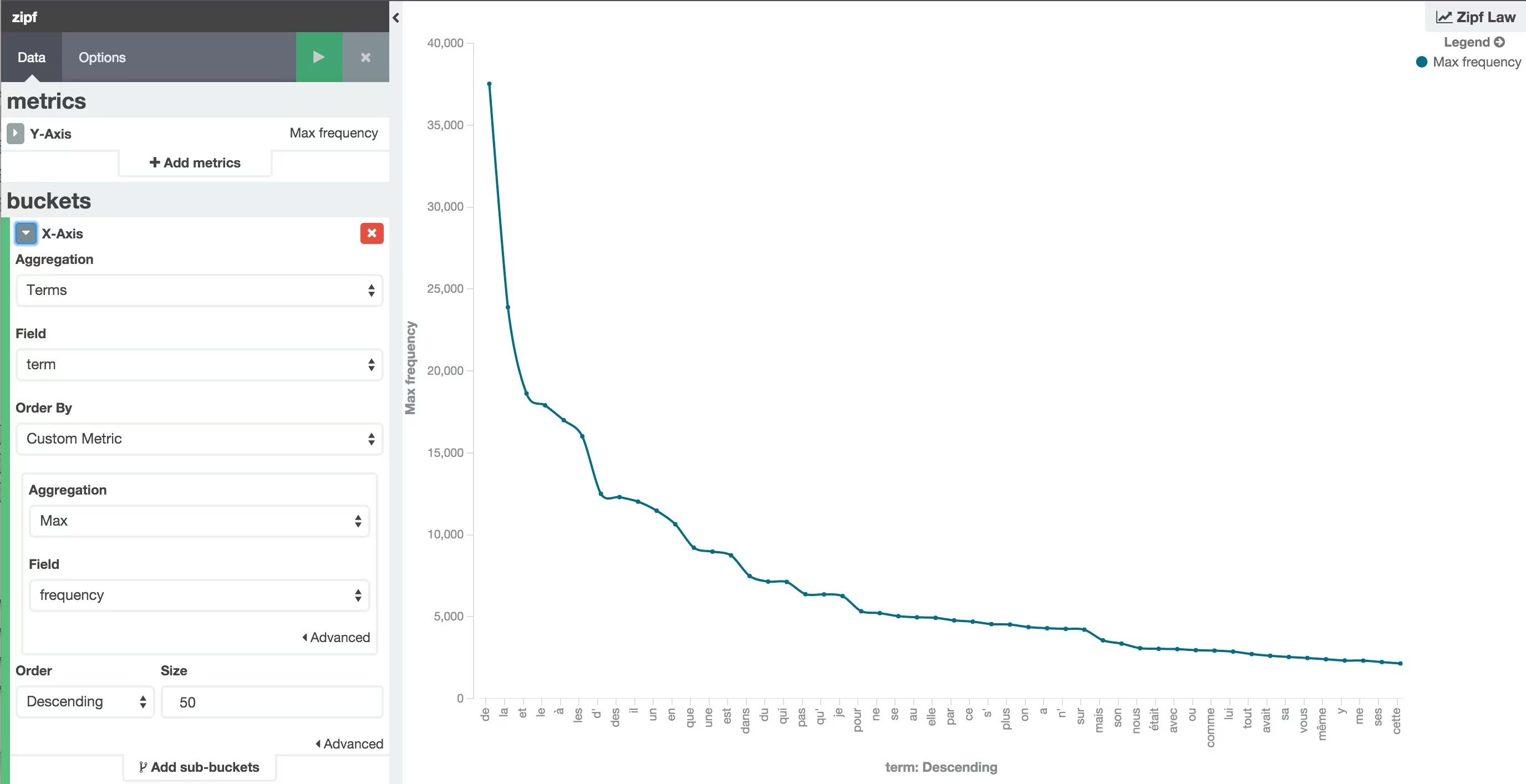
Zipf’s Law
I changed the graph options and used a log Y Axis scale and also increased the number of terms to 1000.
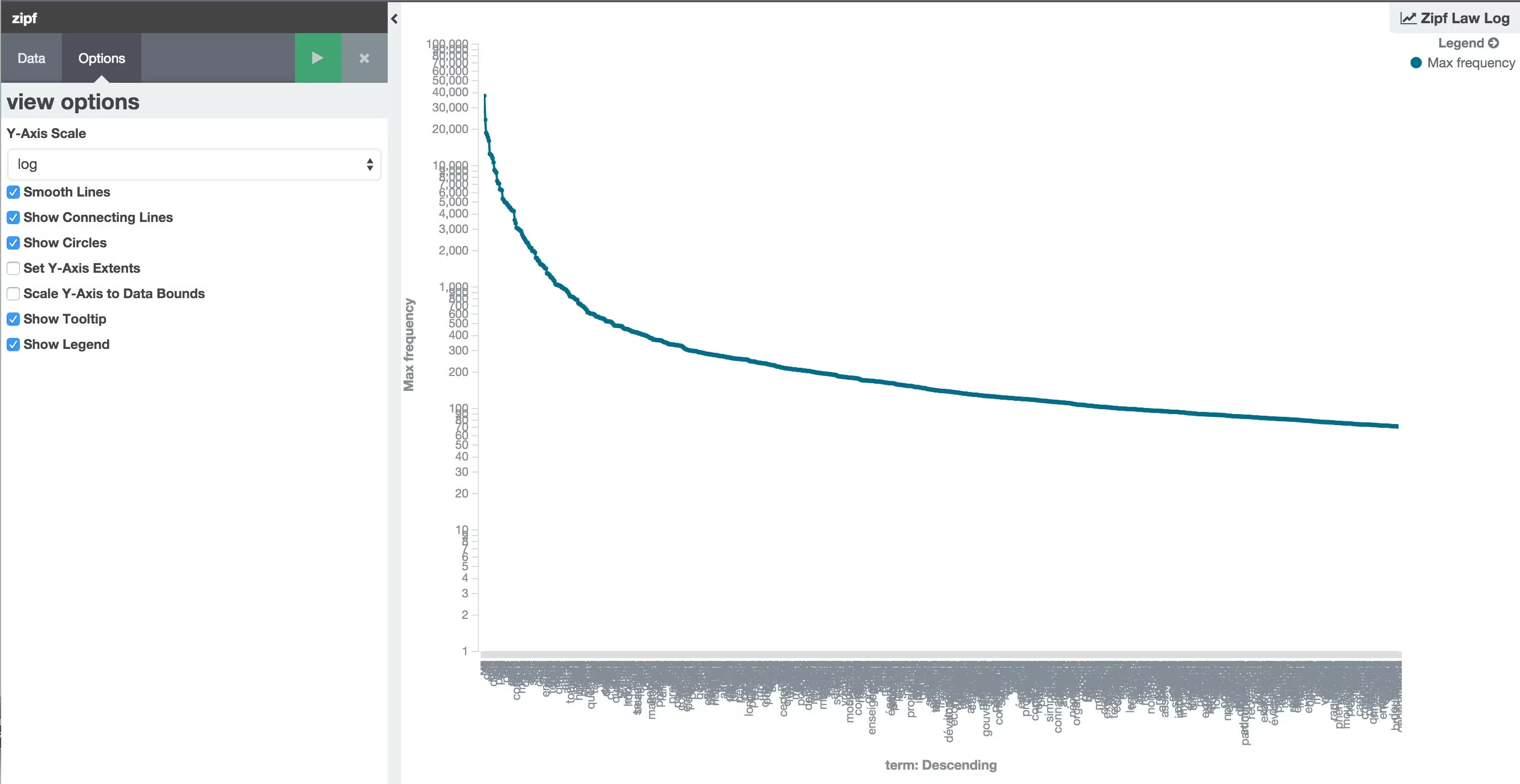
Zipf’s Law Log Axis
Well. It looks close.
I think I should now try to index an actual french book to see how it compares with this data source…
Stay tuned 😀
